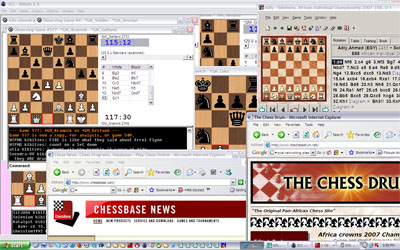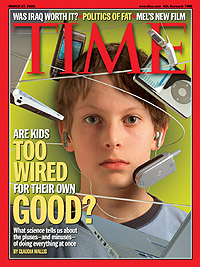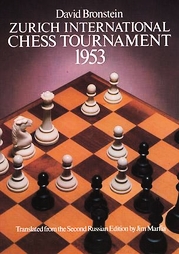The Importance of Chess Literacy
We often talk about the importance of literacy in society. It is even a contentious issue in some countries… the right to learn to read. Obviously, it is essential to learn the rudiments of writing, reading and speaking. A person respected is one with measured words and a strong pen.

Twenty years ago we began talking about computer literacy and everyone was rushing to learn the latest programs in MS-DOS and tinkering in BASIC. The new language of “computerese” had emerged. Then the age of the Internet, everyone had to learn browsing and searching and the entire platform of information retrieval and access is being defined by the likes of e-mail, text messaging, Google and You Tube. The culture of social networks such as Linked, MySpace, Twitter and Facebook have added to this information explosion.
Chess Literacy & Information Explosion
In our chess world, we have a type of literacy. There is such a proliferation of chess books and software (Rybka, Fritz, Hydra, Hiarcs, Shredder, Zap!Chess) that players are forced to become conversant with to learn the intricacies of openings, middlegame analysis or the endgame tablebases. In addition, there are playing sites like the FICS, playchess.com and Internet Chess Club (ICC) that entertain thousands of players at a time with a playing arena and a chat facility. It is in these venues where players can exchange ideas and debate on games in progress. Sites like chessgames.com provide yet another dimension of chess research and commentary.

The ICC has also added a multilingual Chess.FM to its portfolio and has created a bonanza of audio commentary not formerly available to the chess audience. The blog culture has improved the literary content of chess material as chess players of all strengths engage in discussions that were previously thought to be infeasible at chess clubs. The Daily Dirt has a regular cadre of bloggers that keep the discussions fresh and provocative. In this explosion of information, players continue to be inundated by magazines whose standards are set by quality publications like New in Chess. The options are endless and it forces chess players to become more and more literate in the language of chess.
It is interesting to see the improvement curve sharpening in young players and there are pointed references to rating inflation. However, is it really rating inflation or are players simply getting stronger because of the vast amount of information they have access to? In addition, the young players of today simply learn differently. They eschew books, have only known life with computers and would rather rifle through a hundred games in a database in one hour than pick up a classic book like 1953 Zurich International Tournament.
Only the diehards will spend hours the old fashion way… hunched over a chess board with a book or magazine. I have personally heard or read of young GMs (including GM Hikaru Nakamura) saying the practice of reading chess books is a waste of time. Apparently, this is not an uncommon thought. There was a recent article in the New York Times titled, “Are Books Passé?” It discussed the increasing migration of books into the digital realm. The question one would raise is whether playing countless 3-minute games on the ICC the new age way of knowledge acquisition. We often say “experience is the best teacher,” so maybe a new chapter of epistemology has to be written.
Millennial Chess Learning

The big question is how to bridge the old methods of literacy with the new. There is certainly a place for grinding through scoresheets and playing the variations over a real board. Of course, that is where games are actually played. However, which method produces a greater literacy? Those who argue in favor of analysis with a board will say the interactions are deeper, more intimate and thus more lasting. Computers will only be used to check variations and tactical lines after the real analysis is done.
Then there is the other school… the “millenial learners” with their multitasking style. To gain literacy these players may play blitz chess on the ICC, carry on a couple of chat conversations, browse ChessBase.com, while listening to their favorite music on their iPod. They may claim that the multiple types of information provides a richer, varied experience and thus a more powerful impression. Perhaps.
There was an article in Time magazine last year raising the question “Are kids too wired for their own good?” The emphasis was on the youth, but the trend has become pervasive in contemporary chess culture. Are we developing shorter attention spans and thus comprehending less by rifling through variations and games in computer databases and websites? Is this trend helping or hurting chess literacy? Personally, I still like flipping through New in Chess and going through the annotated games, but in many ways there is a strange feeling of insecurity when a computer is not involved. Food for thought.
Literacy and National Performance
There are mountains of literature that discuss the social importance of literacy and its role in the development of human capital. The question becomes, “How does one attain literacy?” If we can look at chess literacy in the same vein, we can say it is of utmost importance in development of chess potential. It is interesting to note the rise of India. The country has created a culture of chess that is infectious. Bolstered by the legend of Viswanathan Anand, chess has been made accessible to the masses. Anand visits India every year and has done a lot to promote chess. In addition, he has a press entourage covering every tournament he participates in.
There is now a Chess-FM station for India and if one subscribes to a news agency for chess, much of the content comes from Indian newspapers and media outlets. This barrage of content helps to educate the Indian public and increases excitement for chess… for players and non-players like. This excitement then encourages corporations to get involved to take advantage of the public interest. With such generous attention being directed toward chess, it is no accident that India has become the fastest growing federation among the elite nations.
Some years ago I presented a paper at a conference on “African Virtual Libraries” and came across many readings citing Africa’s lack of information infrastructure. This is well-known and it applies to chess literacy on the continent. In my six years of running The Chess Drum, I have heard countless stories about the continent’s lack of chess literature. Of course Amon Simutowe’s recent feat of earning his 3rd Grandmaster norm is somewhat of a marvel because he initially studied games by going through old magazines from England. The problem remains and African federations still struggle to make the most of their situation with a scarcity of software, computers and chess literature.

Poor chess literacy certainly impedes the progress of whatever talent exists. Authoring of books, game annotations, audio commentary, chess photography and the creation of blogs and websites are all a part of the building of chess literacy. Currently there are hundreds of chess blogs around the world, countless game archives and thousands of chess websites dotting the virtual universe. However, the global distribution is still uneven.
The acquisition of literacy is dependant on the quality of the information infrastructure. This has certainly become true in chess. Chess players are increasingly forced to become more literate and rely on books, magazines and databases for chess immersion. Unless there is some type of improvement in a nation’s information infrastructure, federations will continue to lag behind in knowledge acquisition and national chess development.

Daaim –
I must admit, I had to read your article several times, before I could grasp what you were saying. My mind is not as sharp as it used to be .. or at least its not as sharp as I used to think it was.
It seems to me that literacy in and of itself is not the initiator of achievement. It is instead one of several manifestations of a more fundamental driver. Yes, literacy can help accelerate the momentum that is already building — but the question is, what initiates the entire process.
I don’t pretend to fully understand the mechanisms, but the recurring theme seems to be a type of group self-actualization. The Harlem Renaissance was born out of the newly unleashed creativity of African Americans escaping the neo-slavery of southern Jim Crow. Or hip-hop being a cultural movement catalyzed by urban blacks expressing the underlying theme “you can buy it, but only I can be it.”
So my hypothesis is that chess literacy among blacks, as creators, will only grow when a critical mass of blacks see chess as a vehicle to achieve something worthwhile that is otherwise difficult to achieve.
The lack of comprehension may be my own shortcoming… I really put many different issues in one essay. I had so much I wanted to discuss. The chess literacy question is becoming more pertinent since talent is being developed younger and younger.
Literacy may not be an initiator of achievement, but how does one harness talent without such a foundation? For example, how can a chess player realize his true talent without annotating his/her games? This literary exercise in chess is an aspect of self-actualization. We analyze games not only to understand which moves/variations are better, but to understand ourselves better.
Your group self-actualization is interesting! I have observed the social habits of chess players in the African Diaspora over the past several years and while my findings are non-scientific, I have noticed some trends. I have learned that while we love chess immensely, we generally play a passive role in literary expression (e.g., annotated games, articles, books, photographs, interviews, commentary, blogs, websites, etc.). It’s a trickle. The question is why?
I hate to keep mentioning India, but they have created a chess culture that will be unrivaled in 10-15 years. They have essentially made chess literacy a part of their social culture. Chess only trails cricket in popularity in a country of over one billion inhabitants. Imagine the impact Anand’s title will have on chess in India and within the Indian Diaspora. I was touched by the 11-year old Indian boy who traveled from the U.S. to Mexico to see Anand play.
In the coming years, there will be several books on Anand written by Indians and by Anand himself. This literary effort creates a legacy that will last generations and as a result, India will be guaranteed another cadre of strong Grandmasters. Anand has Viyay Kumar… the journalist dedicated to following Anand’s career and documenting his results. It is my belief that Vijay has played a huge role in popularizing chess in India by making chess literature widely available.
Its an intriguing question .. why is chess literacy not developing vigorously in black nations and/or communities? I try to look for parallels in other segments of culture, and therefore return to hip-hop. There is now a flourishing (exploding) amount of urban black themed novels… i.e. hip hop literacy!
But he literacy growth didn’t come until over 30 years after the growth of the underlying cultural movement began. It seems to be a kind of supply and demand issue. It not surprising that next to the Drum, Maurice, has singularly produced the most mainstream chess literature … book, software, training site, etc. He was for a long time the only black GM.
I believe chess is not developing in our communities because we are not producing literature at the levels to sustain the momentum. One reason in adding the blog to The Chess Drum was to increase literary contributions. Discussing chess and exchanging ideas is so much a part of building a chess culture.
If we look at the strongest Black players, they tend to have some involvement in chess literature. Maurice has done commentary, CDs, DVDs, books, a training website, lectures, interviews, etc. He recently told me that he is going to drop a “bombshell.” You give Emory Tate an audience and he will show off his amazing literary skills during his analysis sessions. 🙂 Amon is a voracious reader, is very knowledgable about chess affairs and LOVES talking about chess. He also has annotated many of his games for The Chess Drum and I’ve interviewed him a couple of times.
Although Stephen Muhammad is rather quiet on the literary front, many do not know that he was once a columnist for Georgia Chess magazine! Each of these men have not only helped to inspire players worldwide, but have provided examples of chess excellence. Interestingly enough Jamaican Federation President Ian Wilkinson is quite a chess literary scholar and has build a viable chess culture on that island. In Africa, Botswana’s Kenneth Boikhutswane writes first rate news articles. There is hope! 🙂
Daaim, I would like to write a lot more on this interesting topic, but for now I just want to throw out an idea I have. I think your comment above will serve to emphasize my point. My observation about chess literacy in general, not just in chess amongst players of African backgrounds, is that people tend to embrace the works of top class players! In your comment above, the emphasis is on the IM’s and GM’s primarily. That is, people are accustomed to a certain standard, or maybe “perceived standard” of accomplishment before any literary work is produced and acceptable. In this regard, I would say that just because a player is an accomplished chess player doesn’t mean that he or she can produce any worthwhile literary work ❓ The other thing about the latter point is that chess literature is usually synonymous with works on the game itself, that is, analysis, openings, endgames, etc. Chess is so much more, and certainly it’s a metaphor for many aspects of life! If the model of the strong player writes hold, I suspect that sense we suddenly have 3 GM’s of African decent, and several IM’s, we should see more literary work from some of them! Also, there’s money issues, time, and more… more later!
I agree and support points raised by Comments 4 and 5 by
Daaim Shabazz and ETJ respectively.
The following points by ETJ really strike a chord:
‘In this regard, I would say that just because a player is an
accomplished chess player doesn’t mean that he or she can
produce any worthwhile literary work :?’
‘Chess is so much more, and certainly it’s a metaphor for many
aspects of life!’
Producing quality literary works in chess should be considered
equal to producing quality literary work! Anyone who has
something to say can say it with many shades of relevance.
Chess Literacy can be fostered through quality communication of
chess ideas or ideas useful to dynamic chess growth.
As an aside, technical manuals should not restrict their formats
to the different phases of the game. A dynamical system that
details an evolution and beautiful prose should always be
considered as key elements of a chess drama. A good chess
lecture is not simply technical on the surface, but interesting,
and stimulating such that the audience feels able and more
confident to play there own game. The Fireside Book of Chess
contains some elements of this with respect to short stories.
Also, I believe if memory serves me right, Isaac Asimov(chemist,
sci fi writer) does a decent job of describing a brilliant chess
game in the book ‘Pebble in the Sky’!
Peace!!